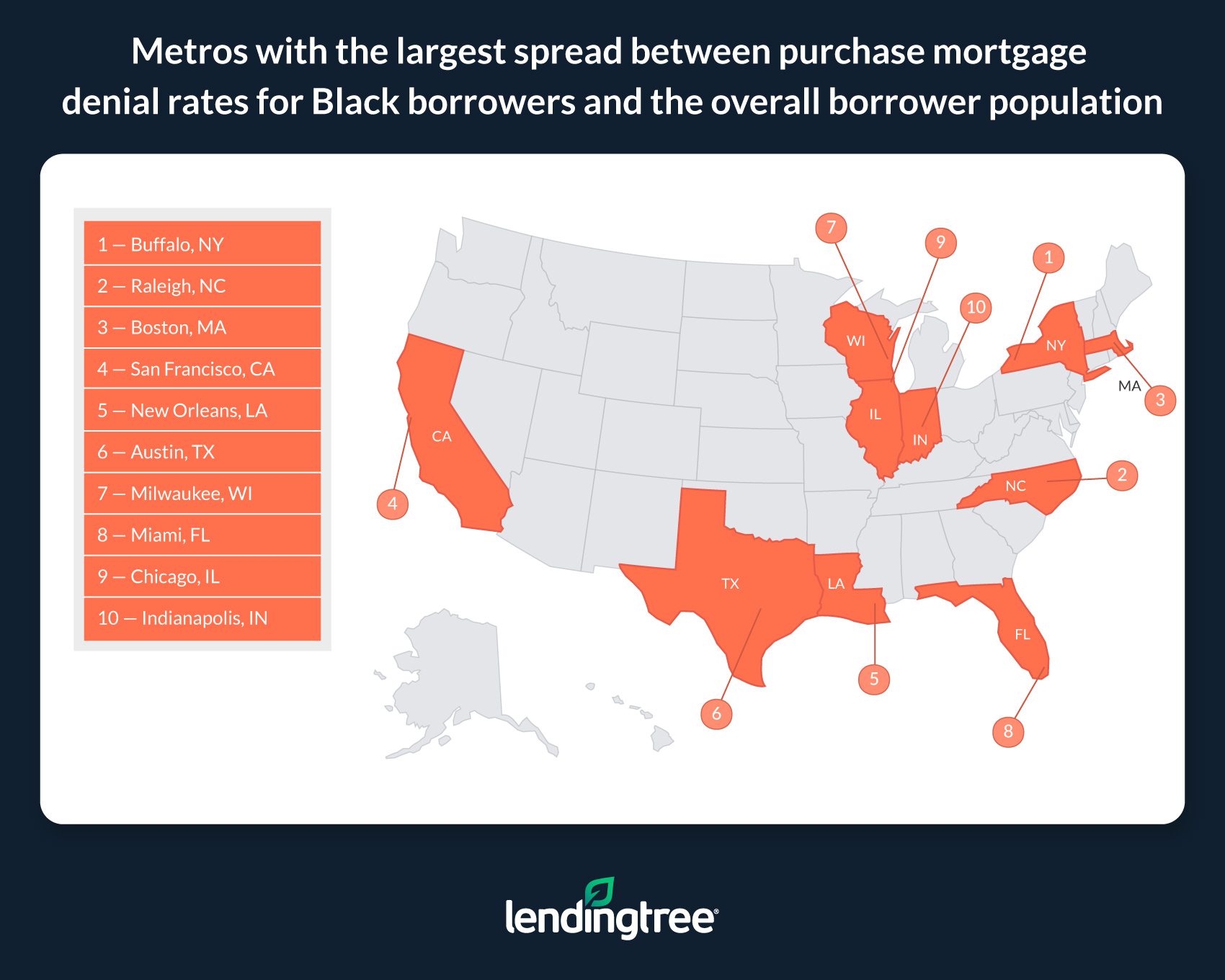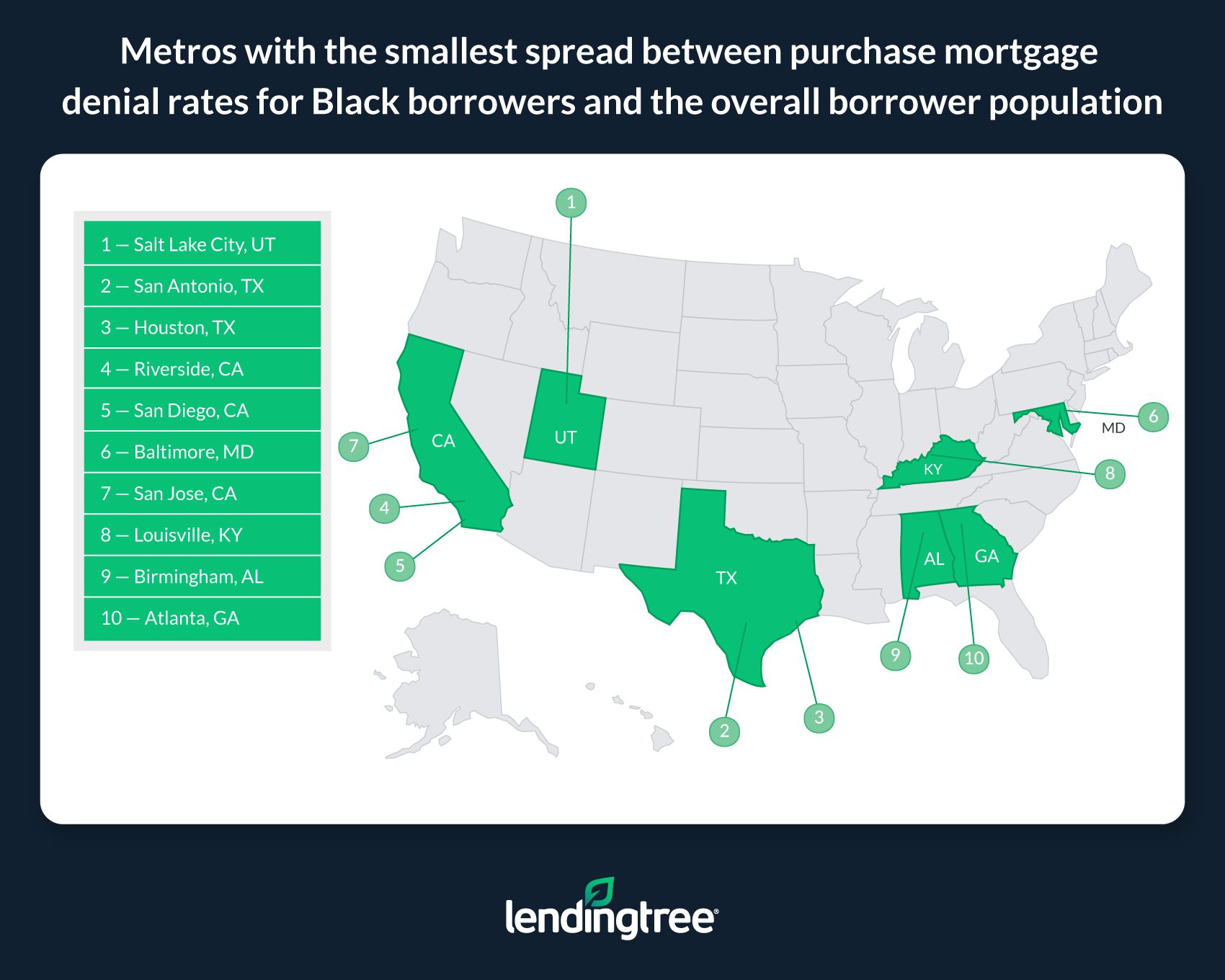Black Homebuyers in 50 Largest US Metros 1.6 Times More Likely to Be Denied for Mortgage Than Overall Population
Black Americans often face significant homeownership barriers, including lenders denying their mortgage applications.
A LendingTree analysis of 2022 Home Mortgage Disclosure Act (HMDA) data finds that the share of Black homebuyers denied mortgages is notably higher than the share among the overall population.
Specifically, we found that the purchase mortgage denial rate for Black homebuyers across the 50 largest U.S. metros is an average of 5.30 percentage points higher than the denial rate for the overall mortgage borrower population.
On this page
- Key findings
- Metros with the largest spread between mortgage denial rates for Black borrowers and the overall borrower population
- Metros with the smallest spread between mortgage denial rates for Black borrowers and the overall borrower population
- Why are denial rates higher for Black borrowers?
- Tips for Black homebuyers
- Methodology
Key findings
- In each of the nation’s 50 largest metros, Black homebuyers are more likely to be denied a purchase mortgage than the overall population of homebuyers. On average, 14.44% of Black homebuyers are denied a mortgage — 5.30 percentage points higher than the average denial rate of 9.14% across the overall population.
- Buffalo, N.Y., Raleigh, N.C. and Boston have the largest percentage point differences between the denial rates for Black borrowers and the overall borrower population. Across these metros, the denial rate for Black borrowers is an average of 8.89 percentage points higher than the overall mortgage denial rate. Plus, their respective denial rates for Black borrowers of 18.43%, 15.89% and 16.16% are higher than those in most of the nation’s other largest metros.
- Salt Lake City, San Antonio and Houston see the smallest percentage point differences between the denial rates for Black borrowers and the overall borrower population. The average spread between denial rates in these three metros is a relatively low 1.78 percentage points.
- Denial rates for Black borrowers are highest in Miami, Detroit and New Orleans and lowest in Salt Lake City, Kansas City, Mo., and Minneapolis. Across Miami, Detroit and New Orleans, the average denial rate for Black borrowers is 20.70% — more than double the average denial rate of 10.19% across Salt Lake City, Kansas City and Minneapolis. Though denial rates for Black borrowers can vary across the nation’s 50 largest metros, they’re higher than 10.00% in all but one — Salt Lake City, with a denial rate of 9.24%.
- The spread between denial rates for Black applicants and the overall population of applicants decreased from 2021 to 2022. The average spread was 5.59 percentage points in 2021, slightly higher than 5.30 percentage points in 2022. From 2021 to 2022, the denial rate for Black borrowers across the country’s largest metros decreased from an average of 16.35% to 14.44%.
Metros with the largest spread between mortgage denial rates for Black borrowers and the overall borrower population
1. Buffalo, NY
- Overall purchase mortgage denial rate: 9.03%
- Mortgage denial rate for Black homebuyers: 18.43%
- Spread between mortgage denial rates: 9.40 percentage points
2. Raleigh, NC
- Overall purchase mortgage denial rate: 7.24%
- Mortgage denial rate for Black homebuyers: 15.89%
- Spread between mortgage denial rates 8.65 percentage points
3. Boston
- Overall purchase mortgage denial rate: 7.53%
- Mortgage denial rate for Black homebuyers: 16.16%
- Spread between mortgage denial rates: 8.63 percentage points

Metros with the smallest spread between mortgage denial rates for Black borrowers and the overall borrower population
1. Salt Lake City
- Overall purchase mortgage denial rate: 8.98%
- Mortgage denial rate for Black homebuyers: 9.24%
- Spread between mortgage denial rates: 0.26 percentage points
2. San Antonio
- Overall purchase mortgage denial rate: 12.31%
- Mortgage denial rate for Black homebuyers: 14.14%
- Spread between mortgage denial rates: 1.83 percentage points
3. Houston
- Overall purchase mortgage denial rate: 12.82%
- Mortgage denial rate for Black homebuyers: 16.07%
- Spread between mortgage denial rates: 3.25 percentage points

Why are denial rates higher for Black borrowers?
While the reasons behind the disproportionately high denial rates among Black homebuyers can be difficult to pin down, various factors likely contribute to this disparity.
For example, Black Americans tend to have lower incomes and less household wealth than members of many other racial groups — namely white Americans. Because lenders usually consider factors like income when issuing loans, Black Americans earning less money can make getting approved for a mortgage more difficult.
That said, it’s important to note that becoming a homeowner isn’t impossible for all Black buyers. And even though they may be less likely to own a house, millions of Black Americans are still homeowners despite heightened obstacles.
Tips for Black homebuyers
Though it may be more difficult for some Black homebuyers to get approved for a loan, there are still ways for Black borrowers to help make their dream of homeownership a reality.
Here are three tips that can make finding a lender and getting a loan easier:
- Shop around for a lender. If you’ve been denied a mortgage from one lender, that doesn’t mean there aren’t others willing to lend to you. Shopping around for a mortgage can potentially increase your odds of finding a lender — and possibly even getting a lower rate on your loan.
- Consider different types of loans. Some types of mortgages, like those backed by the Federal Housing Administration (FHA) or the Department of Veterans Affairs (VA), can be easier to qualify for than other types of mortgages — especially for lower-income borrowers. If you’re having trouble getting approved for a standard mortgage, these options might help you access the funds you need to buy a home.
- Speak up if you feel discriminated against. It’s illegal in the U.S. to discriminate against borrowers based on race. If you feel you’ve been a victim of discrimination, consider contacting your local housing authority or attorney general’s office or the Department of Housing and Urban Development (HUD) to file a complaint. Speaking out about discrimination can help you and others going through something similar.
Methodology
LendingTree analyzed purchase mortgage application records from the Federal Financial Institutions Examination Council’s Home Mortgage Disclosure Act (HMDA) 2022 and 2021 data sets.
Denial rates were calculated by dividing the number of denied mortgage applications by the total number of mortgage applications. The following application types were included in our count:
- Applications that led to a loan origination
- Applications that were approved but not accepted by a borrower
- Applications that were denied
- Applications withdrawn by applicants
- Applications closed due to being incomplete
Preapproval requests — approved or otherwise — were not included in our applications count.
